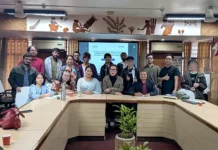ITANAGAR, May 30: The Centre for Development of Advanced Computing (C-DAC) in association with the state information technology & communications department organized a workshop on ‘Digital signatures and public key infrastructure (PKI)’ here on 30 May.
The programme was inaugurated by Controller of Certifying Authorities Junu Rani Das Kailay in the presence o CCA scientist Harshprabha Aggarwal, CDAC senior director Dr Roshni VS, Neelam IT Director Yapin Tana, and officials of the C-DAC and the state government.
The C-DAC officials explained the importance of understanding technology behind digital signatures and PKI, which will contribute towards the growth of ‘Digital Arunachal Pradesh’ and Digital India’ as a whole.
A digital signature takes the concept of traditional paper-based signing and turns it into an electronic ‘fingerprint’. This ‘fingerprint’, or coded message, is unique to both the document and the signer and binds them together. In short, a digital signature has the same function as that of a handwritten signature. Some of the salient features of digital signature are non-repudiation, integrity and authenticity.
The Information Technology Act 2000 provides the required legal sanctity to digital signatures based on asymmetric crypto systems.
PKI is a set of roles, policies, and procedures needed to create, manage, distribute, use, store, and revoke digital certificates and manage public-key encryption. The purpose of a PKI is to facilitate the secure electronic transfer of information for a range of network activities such as e-commerce, internet banking and confidential email. It is required for activities where simple passwords are an inadequate authentication method and more rigorous proof is required to confirm the identity of the parties involved in the communication and to validate theinformation being transferred. (DIPRO)




